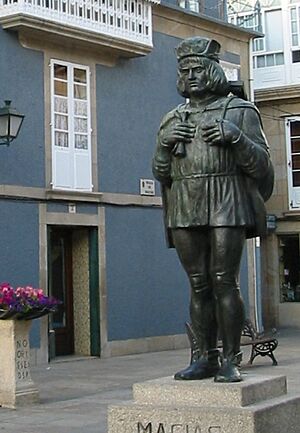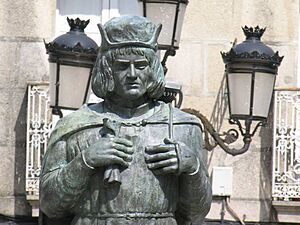Macías (troubadour) facts for kids

Macías (around 1340-1370) was a Galician troubadour. Troubadours were poets and musicians who wrote and sang songs, often about love. Macías was one of the last medieval poets from Galicia. He became famous for his love poems and a sad legend about his life.
Contents
Macías's Life Story
We don't know much for sure about Macías's life. People believe he was from Galicia, a region in Spain. Experts have figured out that he lived in the mid-1300s. This is based on old letters and writings from other poets who mentioned him.
One important letter from 1449 talks about Macías. It says he lived at the same time as two other poets from the late 1300s. This helps us guess when he was alive. Some records also suggest where he might be buried. It's thought to be in a church at the castle of Santa Catalina, near a town called Jaén.
Macías's Poetry
Macías wrote many poems, mostly about love. These poems are sometimes called cantigas. Five of his poems are found in a famous old book called the Cancionero de Baena, which was put together in 1445. People also believe he wrote sixteen other poems.
While all his known poems are about love, he might have written other types of poems too. He probably wrote in his native Galician language, and maybe even in Castilian (an early form of Spanish).
The Legend of Macías
By the mid-1400s, Macías's name was already linked to love. People called him "that great lover" or "idol of lovers." This shows that a legend grew around him after he died. This legend might be based on some real events from his life.
One of the oldest versions of the legend tells a sad story. Macías fell deeply in love with a lady. He tried to impress her with his actions. One day, she fell into a river from her horse. Macías bravely jumped in and saved her.
Later, the lady married another man. But Macías still loved her from afar. Years passed, and he met her again. He asked her to spend some time with him. She did, but then left, worried her husband would find out. Moments later, her husband appeared. In a fit of jealousy, he stabbed Macías with a spear, killing him.
Another version of the story says Macías loved a lady from a powerful court. Her marriage was arranged while Macías was away. He kept trying to win her love, so he was put in prison. The jealous husband then killed him by stabbing him with a spear through a hole in the prison cell ceiling. The legend says Macías died singing love poems for his lady.
A very popular version of the legend appeared in the mid-1500s. It's similar to the prison story. But in this version, the person who arranged the marriage is named Enrique de Villena. However, this part of the story is not true. Enrique de Villena lived much later than Macías.
How Macías Influenced Literature

The legend of Macías had a huge impact on Spanish literature. In the late 1400s, many poems were written about "hells of love." These poems described journeys through a kind of hell where lovers were punished for their strong feelings. Macías often appeared in these poems.
He was seen as a model of good qualities and true love. He was even placed alongside famous lovers from ancient stories. One poem said that Macías's love gave him a "crown of loves" so his name would be known everywhere.
Macías was also very famous in Portugal. Portuguese poets saw him as a symbol of loyalty and constant love. A great Portuguese poet named Luís de Camões mentioned Macías in his poems in the 1500s.
Even though Macías was most popular in the 1400s, Spanish writers kept an interest in him for hundreds of years. In the 1600s, some writers didn't like his emotional story as much. But a famous writer named Lope de Vega made Macías the hero of his play, Porfiar hasta morir. Later, in the early 1800s, another writer, Mariano José de Larra, brought Macías back as the perfect romantic hero in his own play.
See also
 In Spanish: Macías para niños
In Spanish: Macías para niños
 | Jewel Prestage |
 | Ella Baker |
 | Fannie Lou Hamer |

